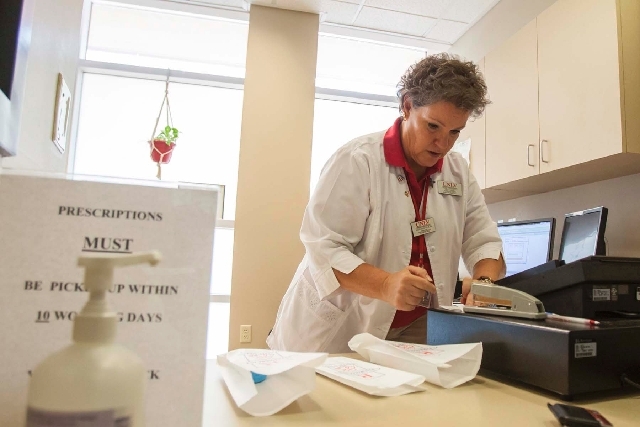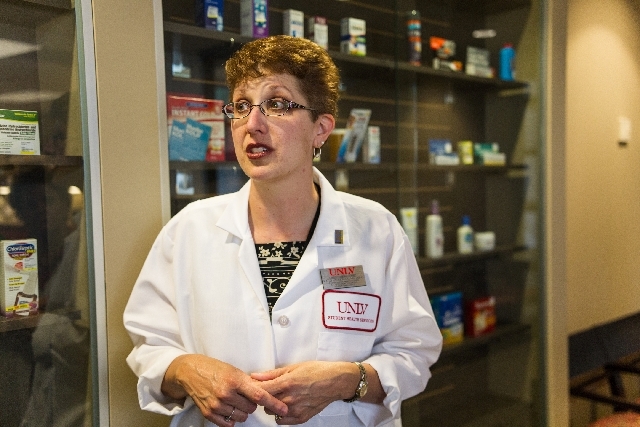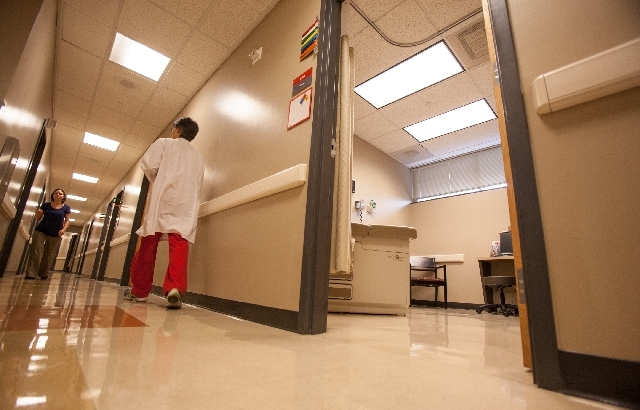Student health centers treat everything from sprains to high blood pressure



With more than 20 comfy examination rooms, a visually appealing pharmacy stocked with both prescription and over-the-counter medications (as well as bowls of freebie items in single-dose packets), its digs in the still like-new Student Recreation and Wellness Center and a range of amenities that includes — honest — massage chairs, UNLV’s Student Health Center is the nicest place on campus that students never want to visit.
But visit they likely will at some point during their academic careers, be it for the flu, a nasty cut, a painful sprain or sports injury, or a sudden-onset gastrointestinal ailment.
And when that day arrives, it could mark, particularly for freshmen, a personal milestone in the student’s life: the first time he or she ever has had to seek out medical care entirely on his or her own, without Mom’s or Dad’s help/oversight/nagging.
“College is such an amazing time in our lives,” says Amie Duford, institutional student health director at Touro University Nevada. “But it’s also very stressful, because (students are) trying to develop new routines and make new friends, and they also become responsible for managing their own health and their own lifestyle and, really, becoming an adult.”
Most students handle their new responsibilities well. They know how to manage their medical conditions. They know when, where and how to seek medical help on campus. They even may have packed among their move-in boxes a few basic first-aid supplies, just in case.
“I think that some students and some parents are very prepared and ready and some, maybe, not so much,” says Kathy Underwood, director of UNLV’s Student Health Center. “I think it’s a journey, and for each student it’s a little bit different.”
For example, Underwood says, students with chronic conditions or other health issues are more prepared because they’re more concerned about how they will do in this new environment.
Other students, she continues, “really don’t have the first idea of, ‘Oh my God, how do I access health care? What (medical supplies) do I have to have in my residence hall dorm room or my apartment?’ They don’t have a thermometer or even access, sometimes, to transportation if they needed to get somewhere.”
Fortunately, “we have so much on campus,” Underwood says. “I always tell my student patients, ‘Come here and talk to one of us, and if someone at the health center doesn’t know, we’ll find someone who does.’ ”
In fact, that’s the most important advice that college health professionals tell students: Consider the student health center your first point of contact, Duford says.
First, it’s affordable. The cost of basic services at college student health centers typically is covered (as it is at both UNLV and Touro) by student fees, and medical insurance is required only if laboratory fees or other additional services are required.
And it’s convenient. Many common ailments — colds, the flu, minor cuts and scrapes, simple sprains — can be treated on-site at a student health center. If they can’t, or if additional diagnostic services are needed, student health centers usually can refer students to affordable outside providers.
Underwood says UNLV’s Student Health Center last year saw close to 19,000 visits, and UNLV’s Mental Health Counseling Center saw between 5,000 and 6,000 visits.
The most common reasons students seek help are for coughs and colds, fevers and the flu, sprains and orthopedic injuries, cuts and gastrointestinal problems.
But, Underwood adds, “I’ve been here over 13 years and I’ve really seen it kind of change. We’re seeing a lot more chronic diseases, and I think it’s for a variety of reasons. The economy has changed over the last few years and people are coming back to school, so we have an older population now. ”
During orientation, parents and students should make it a point to visit their college’s health center and become familiar with its services, Underwood says.
But even before then, parents should send the student to college with a basic medical history that can be useful to college health officials in an emergency or whenever a student requires treatment.
“Even some of our students here have a hard time tracking down their medical records,” Touro’s Duford says. “But prior to leaving, I’d definitely make sure you have a couple of copies of your medical records, and make sure they’re up-to-date and current.”
Useful information would include, first, the student’s immunization record. Duford says colleges typically require that incoming students receive a roster of immunizations that includes an MMR (measles, mumps, rubella) shot, a tetanus booster administered within the previous 10 years, and annual flu and pneumococcus (pneumonia) shots.
Then, a meningococcal immunization against meningitis is “really important for people who are living on a campus in a dorm environment,” Duford says. “Other things would be hepatitis B series, hepatitis A series and, for both men and women, HPV vaccine.”
The latter protects against human papillomavirus, “the most common sexually transmitted disease,” Duford says. “And that’s very important because HPV can lead to cervical cancer.”
A student’s medical record packet should include notes of any allergies; a listing of previous surgeries, fractures and other accidents; notes on chronic conditions; and, even, medical and lab test results that could help to prevent the unnecessary ordering of duplicate tests.
Most importantly, be sure the student’s medical record packet also includes the names, addresses and phone numbers of the student’s primary care physician, specialists, other health care providers and pharmacist. Also include a list of medications the student is taking, along with dosages, and emergency contacts.
Also, if the student is covered by a parent’s medical insurance, include a copy of the insurance card. “My services are free, so I don’t need to see an insurance card,” Duford explains. “But if I end up ordering any type of imaging study or lab work, that would require some type of insurance.”
If a student takes prescription medications, send him or her off with the medications in their original containers.
If possible, try to arrange in advance for a few refills.
Parents also might send students to college with some over-the-counter health care basics they’ll no longer be able to borrow from the home medicine cabinet.
Underwood and Duford suggest that basic supplies a student would find useful include Band-Aids and bandages, antibiotic ointment, alcohol pads or antiseptic wipes, a thermometer, a freezer cold pack, a heating pad, some over-the-counter analgesics (Motrin or Tylenol, for example), throat lozenges and Benadryl.
College students also will be faced with taking responsibility for other health-related decisions involving everything from nutrition to preventing sexually transmitted diseases.
Duford says the U.S. Centers for Disease Control and Prevention’s College Health and Safety Web page (www.cdc.gov/family/college) offers students and their parents a good rundown of basic health care topics.
Underwood says students may take the solo health care experiences they have during college and use them as a baseline for evaluating their medical encounters throughout adulthood.
“I always feel like we’re going to make it a good experience for them so they know, going forward, this is what you should expect from your health care provider,” she says. “You should be going to someone who’s going to listen to you and give you options and discuss those options.”
Contact reporter John Przybys at jprzybys@
reviewjournal.com or 702-383-0280.
DON’T FORGET IMMUNIZATIONS
College students aren’t the only ones who should be doing some health-related homework before the new school year begins.
Parents of Clark County School District students should ensure that their children have received the immunizations the district requires before the first day of school.
Lynn Row, the district’s director of health services, says parents typically do a good job of obtaining immunizations for their children. But, she warns, “students will not be allowed to attend school unless they are compliant.”
Convenient immunization options this year include shot clinics scheduled in conjunction with back-to-school fairs at valley malls. This includes: Meadows mall, 4300 Meadows Lane, on Aug. 10 from 10 a.m. to 4 p.m.; Boulevard Mall, 3528 S. Maryland Parkway, on Aug. 17 from 10 a.m. to 4 p.m.; and Galleria at Sunset mall, 1300 W. Sunset Road in Henderson, on Aug. 24 from 10 a.m. to 4 p.m.
Information about back-to-school immunizations also can be found on the Southern Nevada Health District website (www.southernnevadahealthdistrict.org/immunizations/back-to-school.php) or by calling the health district at 759-0850.
For more information about health-related issues — for example, students who have special medical needs or students who must be administered medications during the school day — call the school district’s health office at 799-7443.












